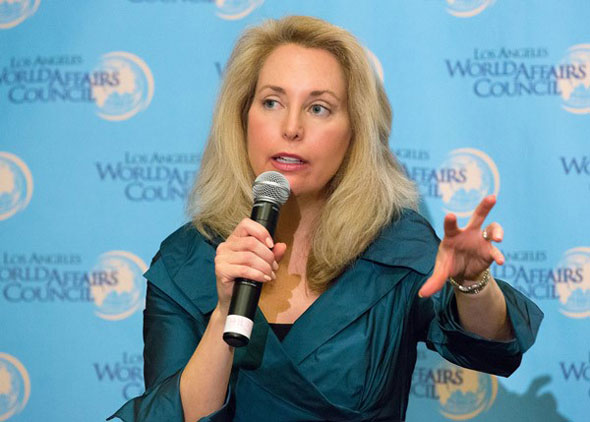 Valerie Plame, former former United States CIA operations officer, speaking at the Council
Valerie Plame, former former United States CIA operations officer, speaking at the Council The US and Iran will conclude a nuclear deal soon, largely because there is no reasonable alternative for either party, according to Joseph Cirincione, who runs the nuclear non-proliferation group Ploughshares Foundation, and Valerie Plame, the former CIA undercover agent who tracked Iran's illicit nuclear efforts until she was outed by officials in the Bush administration. But even if a deal is done with Iran, there is a much bigger danger that we haven't begun to mitigate - the nuclear-armed state of Pakistan, according to Plame and Cirincione, who talked to LAWAC on Monday evening.
Most people think that since the end of the Cold War between the US and Russia we don't really have to worry about the prospect of a nuclear war, and the residual weapons are almost museum pieces that have little chance of ever being used. But both speakers warned there is still a serious danger of a nuclear exchange that could happen by accident, or that terrorists could get hold of a nuclear weapon.
"We survived the 70 years of the nuclear age by luck, not brilliant policy - luck..." said Cirincione. He cited the 1961 incident when a B 52 accidentally dropped a live hydrogen bomb with 250 times the power of the Hiroshima bomb over Goldsboro, North Carolina, and five of six safety systems on the bomb failed - "a $1 switch held and that's why we still have North Carolina. And that is just one of many close calls." Cirincione then told the story of the Norwegian weather rocket that was launched in 1995 - four years after the end of the Cold War - which was interpreted on the Russian early-warning radar system as a US nuclear missile launched from a submarine. "They actually opened up the nuclear football [the case with the codes for launching a nuclear strike] for Boris Yeltsin." This was the first and only time the nuclear suitcase of any nuclear nation had been activated to prepare for a launch. "Fortunately for us, Yeltsin wasn't drunk, and while we don't know exactly what happened in that room, they waited." Cirincione then posed the rhetorical question - "but here is the really scary thing - what would Putin do today? What would we do?"
The scenarios of terrorists with an apocalyptic "end view" buying or stealing a nuclear weapon are both real and sobering. Plame pointed to ISIS - "they clearly have a nihilistic view, their actions have been so barbaric - if they were to obtain any nuclear weapons I deeply believe they would not hesitate to use them."
But both Plame and Cirincione agreed that the single most dangerous country on the planet is Pakistan. "Paksitan has an unstable government, a collapsing economy, al Qaeda organizations operating across the country, and it shares a border with a nuclear armed rival with whom it has fought three wars already," said Cirincione. "We have calculated that if India and Pakistan went to war and used 100 nuclear weapons - which is totally plausible - the dust cloud around the Earth would drop global temperatures by two or three degrees, killing many food crops, and some one billion people would die - does it end the planet? No. But it kills a lot of us."
The Pakistani military supposedly keep their nuclear weapons in secure bases, but because of the shaky command and control structure between the military and civilians, terrorists could hijack some weapons while in transit during a time of heightened military tension. Pakistan also has a dangerous history of proliferation beyond its borders. Plame said she and others in US intelligence followed the trail of Pakistani nuclear engineer A Q Khan who sold nuclear technology to North Korea, Iran and Libya before he was exposed. "We used to joke in the intelligence community that if you wanted anything in the nuclear world, dial 1-800-AQ-KHAN," said Plame.
Cirincione said that although the number of nuclear warheads has gone down from 73,000 in the Cold War to 16,000 today, there is still a lot more disarming that is needed: "If we can work out a deal where we have a few hundred weapons, then we will know we are on the path to safety."
Asked about physicist Stephen Hawking's fear that humanity is fatally threatened by its own hatreds, Cirincione said that "Hawking also said 'as long as there is life there is hope'." When asked about her outing, Plame laid out the history of her husband Joe Wilson being sent to Niger to investigate claims they were exporting uranium to Iraq and discovering it was not the case, and subsequently writing an opinion piece for the New York Times pointing out discrepancies in the Bush administration's claims that Saddam Hussein had a nuclear weapons program. Plame's covert CIA identity was then revealed in July 2003 by a columnist for the Washington Post, having been told by an administration official. "Looking back with the benefit of time and space, these stories of Joe Wilson and Valerie Plame feel so surreal," said Plame, who has written a book about the scandal which was made into a movie with Sean Penn and Naomi Watts. "But it provided a flash point - until that time the administration was a juggernaut and no one was really questioning them..." But on a personal level Plame said it was very painful, involving "a complete wash of all the cases I had run throughout my career".
The world of nuclear weapons is dangerous in more ways than one.
